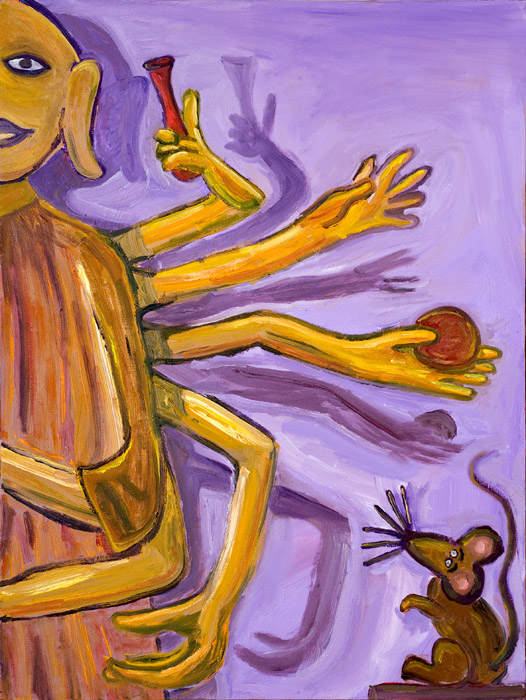
Concerning Tavia
by Martin Hayes

He tried not to breathe. Tried with all his might. With the last triumphant bars of Holst’s – Jupiter, The Bringer of Jollity fading away into silence, he held his breath and willed his heart not to beat. This moment was too perfect to be sullied by such ordinary things. He longed to be frozen in time; his mind was filled with jealous rage at the thought of all those lucky insects sealed in amber.
The iPod was docked in a set of small portable speakers on the sideboard opposite the motel-room window, a concession to nostalgia. He didn’t like modern technology. He raised his hand and eased the sound down still further with the tiny remote. His senses were filled with her; with the smoothness of her skin, the fluid curve of her naked hip as she lay on the bed beside him, the million angles and occulted planes formed by the sheets where they crumpled around her feet. When he could hold it no longer and was forced by his biology to take a breath, her scent ploughed through his lungs like a pyroclastic surge that shuddered his heart and pulled him back in time.
How many years now since she had held him in her arms?
Fifty? Surely.
Maybe fifty-two.
And how many times had he thought of her since then, in those long gray months and years and decades? Did numbers go that high? He did not know, but it seemed unlikely. It was an obsession of sorts, of course it was, but that was not entirely the right word, for obsession seemed to imply a certain undertone of malevolence, and it had never been that way.
He scuttled down in the bed a little, drawing nearer to her. He wanted nothing more than to dream with her, to drift off into slumber with her supple arms about his neck, her legs intertwined with his. That would be a fitting end to it, more than he had ever hoped for. And yet, it seemed awful now, his old and sallow skin against hers, full of youth and promise. It was distasteful, wrong, did not belong in a world that had any sense of order or place.

He had first dreamt of her when he was nine years old. Those lights, so bright and brilliant. She told him secrets and stories of far off places and when she left him upon waking he felt very sad, bereft, as though he had lost some intricately crafted cogwheel which was essential to the task of keeping his heart in motion. Those dream stories had stuck in his mind and played themselves out (always in her voice, that sweet, mellifluous voice) over and over again in his thoughts as the years went by. More than anything he remembered the lights, and the breeze and the faint hum of the bees all about him as he pushed his bike up the steep dirt track.
And then five years later it all happened for real. The fourteen year old boy woke from a restless sleep at just after midnight and snuck out of the house. His carefully placed footsteps did not disturb his parents. He was excited by this uncharacteristic breaking of the rules. He had never been a naughty child, never one to run off or act up or talk back and maybe that was the reason why this new sensation was so intoxicating, so beautifully rarefied.
The air held a coolness that betrayed the coming autumn as he followed the winds and the pulsing swarms of bees up the sloping track to the old wheat field at the top of Tulper’s Hill. The moon was low but it was bright enough to see her as she came across the fields, butterflies danced about her and on the air a scent of golden primrose came his way. And then, as she neared him, the bees swept down and engulfed her, spinning, rotating like a tiger-striped whirlpool and when they once more took to the star filled sky he could see that she was beautiful.
Honey dripped from her arms as she embraced him, he could feel it, slow and slick, taste it as it ran from her chin into his hair and down his face and always the humming of unfeasibly small wings and the tickling brush of butterfly tongues. Her grasp was tight and he did not mind. It was like being held deep inside the earth, countless tons of pressure overwhelming every square inch of his young flesh. It was like the sucking embrace of a flawless black hole. She whispered to him, told him her name and he realised that he had always known it.
He awoke at dawn and it seemed as though he had been asleep for a thousand years, everything was different, more than anything, he was different. And there had been so much to remember, so many fine details and things that might go wrong. But he was smart and sharp and he did all that was asked of him.
He was not surprised when they said that he was mad.
He would never forget the look on his parent’s face when he returned home that morning to find them sitting at the kitchen table, worried sick and debating whether to call the police or to give it another hour. His mother slapped his face and then pulled him tight and held him for a long time. They sat him down and asked him where he had been, what the hell he thought he was playing at. And, of course, he answered their questions, but he did not tell of the beautiful woman or the bees or the butterflies. He spoke only of the stories, the scenarios that had been described to him and he asked his parents how he would ever get the people to believe him.
His mother and father listened and with every sentence he uttered they seemed to grow more disturbed. When he was finished speaking he looked into his mother’s eyes and saw there a look of utter pity. On one level she was scared, scared that maybe he was on drugs, but stronger than this primal maternal fear was the wave of shame that washed across her face. She had listened to the details of the plan he would set in motion, had heard him speak of strange things to come, curious fluctuations in time and geology which, if not actively looked for, would be oh so easy to miss entirely: she had listened to all of this and the only conclusion that she could come to was that her son had lost his mind.
Occasionally, in the childhood years that followed, he would mention something of this to a teacher or a friend and they would call him mad, or think that he was joking, or sometimes ignore him entirely, pretend that they had not heard—it was a subtle trick of the brain, one which the performers did not even realise they were carrying out.
He wondered if, perhaps, the end had always been known, that the cause and means of the ultimate extinction had been perceivable ever since that first autocatalytic reaction in the primordial soup. Perhaps it had always been there, for all to see, if only they would look, but the knowledge had been too immense, too overwhelming, so much so that the species had built up a kind of cerebral firewall, a mental barrier that blocked information pertaining to the end.
He went to college and took the subjects which he felt would better his ability to explain all this to people unstudied in the sciences. He did not sleep much, for when he did he dreamt of her and the pain of waking was too much to bear. And there, too, he encountered titters and smirks when he broached the subject, people talking under their breath as he passed in the corridor.
Once, while giving an impromptu talk about this during a lunch break to a group of fellow students and several professors, he was forcibly ejected from the room by a group of incensed chemistry majors.
They would not listen.
Did not want to.
Even when he set out verifiable, reproducible evidence they still refused to hear. He was just a crackpot, a loony—everybody knows his mind is gone.
And so it went, for over half a century, until one evening near the end of time he was walking back from a small and ill-attended lecture in a dusty town, his back-pack full of flyers and that crusty old iPod tucked into his trouser pocket when he saw the butterflies flit and dance on the sidewalk and heard the drone of the bees as they swirled about his ankles and there, ahead of him, shimmering against the low coppery disc of the sun, she came to him once again. He pinched himself hard on the arm, desperate to be sure that this was not a dream, even clawed his fingernails down the liver-spotted skin so hard that he drew blood. And as the red drops blossomed in the gray hair foliage, he smiled wider that he had done since that moonlit hillside half a century before.
His motel was just across the street. She took his hand and led him across the quiet road. He felt as though he was standing in the heat of a high midday sun that warmed his bones and nourished his heart.
The night passed slowly, and in strange increments.

She reached over and rested her perfect hand on his chest and said, “Do not fear, my love. You are not to blame.”
Tears filled his eyes and spilled down his face. He knew that her words were true and yet, he could not help but blame himself. He reached down and brought her hand to his old thin lips. She tasted of honey and sunshine. His heart was pounding, and in it he felt like a little boy again. She pointed at the iPod with her empty hand and the volume increased. Saturn, The Bringer Of Old Age spilled from the speakers.
“Will there be music?” he asked, choking back tears as the melody engulfed them. He fancied he could see the music, washing across her skin like morning light dappling across the surface of a clear, deep lake. She held him in her arms and pressed her lips to his forehead, “No, my love . . . no music, nor tears.”
He lay in her embrace and thought of all the things that he wanted to say, the oaths and promises and pacts that he had made a million times through what had seemed like a million years. “Oh Tavia. Why us? Why did it have to be us?”
He felt lightheaded; the beat of his heart seemed very far away now. She kissed the tears from his face as he asked, “Oh God please tell me . . . is this real?”
She did not answer, only stroked his tired face and kissed him once again. Outside, beyond the grubby curtains of the motel-room window, the world was catching fire.
About the Author

Photo credit Gerry Hayes
Martin Hayes lives in a small town on the east coast of Ireland. He works in a shipyard and looks forward to seven o'clock so that he can go home, wash the grime off, and drink some Guinness. The title Concerning Tavia (the seed from which the story grew) is stolen from a line of dialogue contained in an old John Wyndham story.
Post a comment on this story!